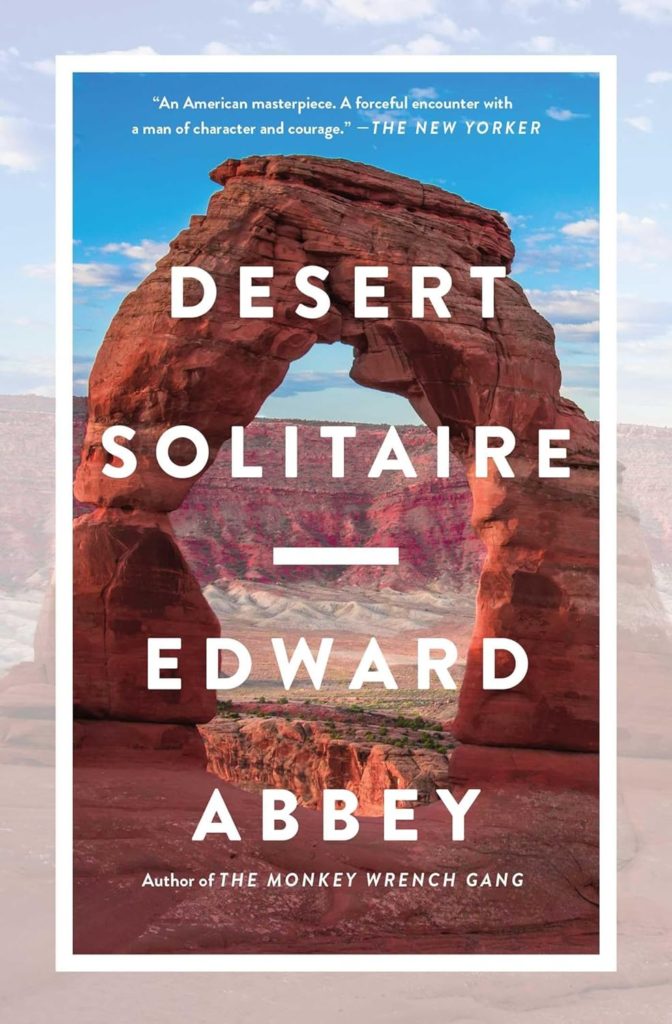
This is the final book review of a series of three books that influenced me to venture in to deserts. The result of my first forays into desert environs has been a 50+ year love affair in these seemingly stark and inhospitable wastelands, which they are not at all. Not only are deserts my favorite places to hike, camp and backpack; I have lived in the Lower Colorado Desert since 1977.
The two previous “desert” book reviews can be found here:
Book Review: The Thousand Mile Summer, by Colin Fletcher
Book Review: The Man Who Walked Through Time, by Colin Fletcher
Desert Solitaire is a much different work than the two books of Colin Fletcher’s I just reviewed the past couple of days. Fletcher’s are woven around two long-distance hikes. The hikes set a structure for his prose, but in the end, he has to finish the walks. A multi-week or multi-month walk injects a schedule, or maybe better put, a focus on completing the trip itself where observations of nature must, at times, become secondary. Many of Fletcher’s books were about how to survive in the wilderness; Abbey’s is more about how to help nature and wilderness survive mankind.
Before we delve into Edward Abbey’s Desert Solitaire, there are some comments and perceptions of the man himself we need to address.
Criticisms of Abbey
Abbey was certainly an extreme environmentalist, anarchist, and atheist. Many accused him of being racist, xenophobic, and a misogynist. The first three are true; we can say that these characteristics are good or bad, depending on one’s personal beliefs. As for the last three, I haven’t read enough of his work or comments to make an informed decision.
Some people would argue that if an author is racist, xenophobic, or a misogynist then it would be wrong to purchase anything that would provide financial benefit to the writer. That’s a personal decision; however Abbey has been dead for 35 years and there is no profit to him if people buy any of his books today.
Abbey had his flaws and is probably not an individual one would want to idolize; I certainly do not.
Colin Fletcher and Edward Abbey were contemporaries and popular at the same time, both renowned as nature writers. Yet they never met, and apparently really didn’t care too. Perhaps it was professional jealousy. Perhaps it was, personality-wise, two opposites.
If the negative things about Abbey are true, it doesn’t mean there wasn’t any value in his writing — because there is — especially Desert Solitaire.
I’ve read a couple of his novels. They are horrible in my opinion. I also read and enjoyed, Down the River; a book, like any great book, that should be read more than once.
Background
Abbey earned a B.A in philosophy and history, and masters degree in philosophy from the University of New Mexico. In 1956 and 1957 he worked as a seasonal ranger in Arches National Monument (now Arches National Park) in Utah.
Desert Solitaire was published in 1968 and much of the book is set in that location. Other parts of the book are taken from his journeys and other jobs in the American Southwest in the same time period.
Review
Although autobiographical, it is more than a memoir or even a nature book; it’s a heartfelt contemplation of the American wilderness and his desperate need to protect it.
The memoir part is there, along with a manifesto-type declaration, critical of the modern relations between humans and nature, and more particularly, the failed job of government as caretakers of our wilderness lands.
The “nature writing” is there too. Through his vivid descriptions of towering mesas, expansive skies and red rock canyons, he brings the landscape to life — a desolate land and at the same time a vibrant one.
The 1960s were a tumultuous period of combative protests of government policies. Desert Solitaire reflects the times in which the book was written. Abbey’s blunt commentary on environmental and social issues seem to suggest a deep rooted hatred of modern civilization.
Desert Solitaire is combative. He characterizes government stewardship of public lands as “industrial tourism” — government, the people, and businesses in America conspiring to turn our wilderness areas into car-polluting amusement parks. With hindsight we see he was right about much of this. In the 1950s Arches National Monument was a dusty, unimproved jewel of the desert. Today it is a traffic-jammed, reservations only nightmare; except for the few that are willing to park their vehicle at a trailhead and hike far enough into the park where few people wander. And this is Abbey’s wish — to dynamite all the roads to and inside the park — allow only human powered travel.
Abbey’s voice is straightforward. We hear his love of the desert and his frustration with human impact on the environment. Unlike writers such as Henry David Thoreau or Aldo Leopold, he doesn’t romanticize wilderness. He calls it as it is — potentially dangerous and unpredictable, and exceedingly beautiful at the same time.
However, Desert Solitaire is not without its challenges. Abbey’s voice can be off-putting. His views, especially his criticism of modern civilization, may come across as extreme environmentalism. Some readers may feel he is elitist. Some may find Abbey’s voice abrasive, others will appreciate his aggressive advocacy for protected wilderness.
Desert Solitaire asks us to reconnect with the natural world on its own terms. That wilderness is, or should be, important to everyone. Not as a recreation destination, but as a place where we can experience the natural world in more meaningful way. Abbey challenges us to question our own relationship with nature and to consider what we will to lose if we continue to exploit it.
This website may be compensated for linking to other sites for sales of products. As an Amazon Associate I earn a small fee from qualifying purchases at no additional cost to the purchaser.


